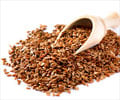Dietary therapy using flaxseed may help decrease hot flashes in postmenopausal women who do not take estrogen, suggests a new Mayo Clinic study.
Dietary therapy using flaxseed may help decrease hot flashes in postmenopausal women who do not take estrogen, suggests a new Mayo Clinic study.
A hot flash is often described as a flush of intense warmth across much of the body that may be accompanied by sweating, reddening of the skin or cold shivers, according to the background information in the study published in the Journal of the Society for Integrative Oncology.Hot flashes occur in varying frequency and duration, even during sleep, and often cause or accompany sleep deprivation, anxiety and irritability, the article says.
“Hot flashes are a bothersome issue for women experiencing menopause. We hope to find more effective nonhormonal options to assist women, and flaxseed looks promising,” says Dr. Sandhya Pruthi, Mayo Clinic breast health specialist and the study’s primary investigator.
Hormone replacement therapy was the most commonly prescribed treatment for hot flashes in recent past, but unwanted side effects have led to the search for non-hormonal solutions.
While several effective non-hormonal drug therapies are in existence, they are not always effective, and not all women can use them because of side effects.
Mayo clinic researchers involved in their study 29 women participants with bothersome hot flashes. The subjects did not want to take estrogen because of a perceived increased risk of breast cancer. They also had not received (in the preceding four weeks) antineoplastic chemotherapy, androgens, hormonal agents, or other herbal supplements, including soy.
Advertisement
It was found that the frequency of hot flashes decreased 50 per cent over six weeks, and the overall hot flash score decreased an average 57 per cent for the women who completed the trial. Participants also reported improvements in mood, joint or muscle pain, chills and sweating, which significantly improved their health-related quality of life.
Advertisement
Flaxseed contains is a phytoestrogen that contains omega-3 fatty acids and lignans, antioxidants with weak estrogen-emulating characteristics which have some anti-cancer effects, say the researchers. Flaxseed also appears to have anti-estrogen properties and has been shown in some recent research trials to decrease breast cancer risk, they add.
Dr. Pruthi, however, cautions that the results are preliminary and taking flaxseed may not give relief to every woman suffering hot flashes.
“While results were promising, we have more research to conduct. Oftentimes, pilot studies show promising results that upon further study in a large, randomized placebo-controlled study turn out to be much less remarkable,” she says.
Source-ANI
SRM/J










